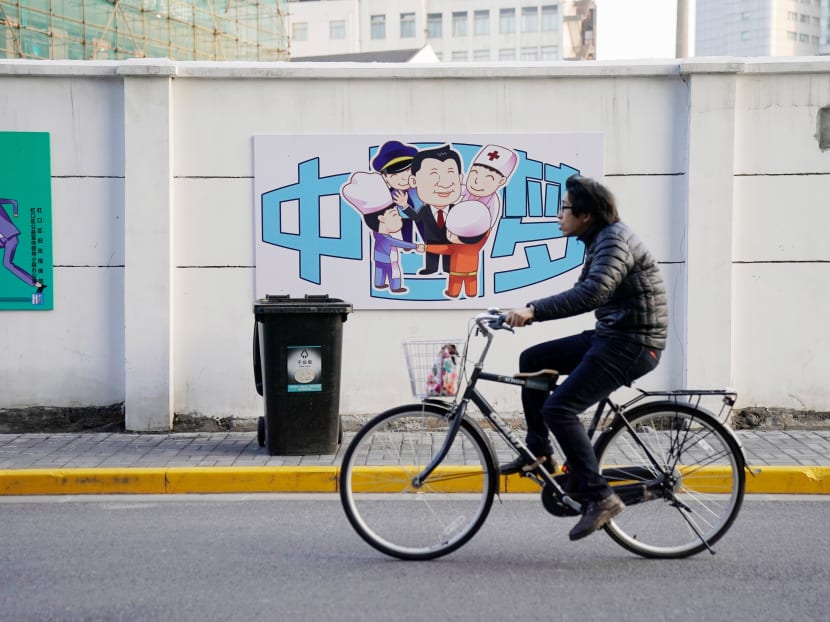Liberals in Hong Kong fear for city’s future as China falls back on strongman rule
HONG KONG — Late paramount Chinese leader Deng Xiaoping once declared in a momentous speech in the early 1980s: “Good systems can prevent bad people doing whatever they want, while bad systems can make good people unable to do good things or even drive them to do bad things.”

A cartoon depicting Chinese President Xi Jinping with the Chinese characters reading "Dream of China" is seen on a street in Shanghai, China. Liberals in Hong Kong fear for city’s future as China falls back on strongman rule. Photo: Reuters
HONG KONG — Late paramount Chinese leader Deng Xiaoping once declared in a momentous speech in the early 1980s: “Good systems can prevent bad people doing whatever they want, while bad systems can make good people unable to do good things or even drive them to do bad things.”
The oft-cited remark back then comforted Mr Martin Lee Chu-ming, the founding chairman of Hong Kong’s Democratic Party, who feared for the city’s future ahead of its return to Chinese rule in 1997.
“I was delighted when I heard that, as Deng was suggesting (the country) should not be relying on a single person who would make mistakes and die one day,” recalled Mr Lee, who helped draft the Basic Law — the city’s mini-constitution — in the late 1980s.
“I do not need to worry too much if China values the importance of institutions.”
But Deng’s statement is back in vogue among Hong Kong’s liberal elite after Beijing’s bombshell announcement on Sunday (Feb 25) that there should be no term limits on China’s president and vice-president, effectively paving the way for President Xi Jinping to stay in office beyond his second term.
To this camp, the move is tantamount to weakening the foundations laid by Deng.
Some politicians and China watchers fear Mr Xi’s uncompromising stance will mean an ever greater emphasis on one country rather than two systems, and upon restrictions on the rights and freedoms that Hongkongers currently enjoy. Economists meanwhile believe it may benefit the city’s economic development in the short term, assured as it would be of several key Beijing initiatives to boost its prospects.
According to state news agency Xinhua on Sunday, the ruling Communist Party proposed removing from the constitution the line that states the president and vice-president “shall serve no more than two consecutive terms”. The proposal is to be considered by the national legislature next month.
“Many people think the removal of term limits would mean a tougher battle for Hong Kong to achieve democracy — I agree, but that does not mean we should do nothing,” Mr Lee said.
He advised Hongkongers to redouble their efforts to seek greater democracy, especially when the amendment also implied democratic reform was likely to be out of sight north of the border.
Mr Xi himself drew what he described as the “red line” when he visited the city last year to mark the 20th anniversary of the handover from British colonial rule.
He warned against any attempt to undermine Chinese sovereignty amid discussions among young people about Hong Kong breaking away from China.
Veteran China watcher Johnny Lau Yui-siu said such an approach was expected to stay if not intensify under Mr Xi’s leadership, and it would be very difficult for the city to launch any constitutional reform that could actually bear meaningful fruit.
But Beijing-friendly scholars were less wary of the proposed change.
Professor Lau Siu-kai, vice-chairman of the Chinese Association of Hong Kong and Macau Studies, a semi-official think tank, said the amendment was only intended to ensure the rule regarding the president was on par with that concerning the party boss and military chief, who already do not have term limits.
Associate Professor Tian Feilong at Beihang University’s law school in Beijing also said the high degree of autonomy Hong Kong enjoyed would not be harmed after the constitutional amendment.
“That is because the central government has already laid down its direction for Hong Kong at the 19th party congress. That has already been decided,” Assoc Prof Tian said.
He was referring to Mr Xi’s remarks at the twice-a-decade congress last October, where he called for the melding of Beijing’s “comprehensive jurisdiction” with Hong Kong’s high degree of autonomy in an “organic” or natural way.
Putting politics aside, economists expected short-term benefits for Hong Kong with Mr Xi staying on in power.
Mr Andy Kwan Cheuk-chiu, director of the ACE Centre for Business and Economic Research, said the “Greater Bay Area” development plan and the “Belt and Road Initiative” to facilitate trade along a new silk route were Mr Xi’s ideas and therefore a long tenure would bring stability to the city’s economic development.
But he said one could not rule out potential political jockeying in mainland China that could cause longer-term economic concerns, as not everyone would be patient waiting in line behind Mr Xi. SOUTH CHINA MORNING POST






